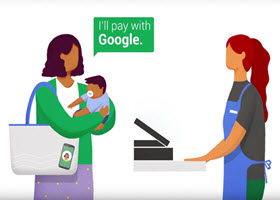As one of the greatest innovators in the mobile app arena, Google just launched its latest attempt at making in-store smartphone payment methods even simpler with their new app called Hands-Free. One of its most innovative features is the fact that once the app is downloaded and installed users will not even have to remove their cell phones from their pockets to affect a payment. The new payment system is currently already available to both iOS and Android platforms, but is still in a testing phase in San Francisco’s South Bay area.
Hands-Free makes use of facial recognition software as well as your phone’s location as two of its identity authenticating features to ensure it is actually the correct user requesting and authorising payment for their own purchase. It works simply by informing the store assistant or cash that you wish to pay via Google, where after they will request your initials, which he or she will then enter into the terminal. The cashier will then be able to view a list of users currently in this area, each with an identifying photo displayed next to the initials.

The cashier will then match the photo to the real-life person in front of them and ring-up the necessary payment. Despite the current version still in its testing phase, Google is simultaneously testing a more fully automated version featuring a camera attached a system equipped with facial recognition software. In this fully automated version the real-time camera image is then matched against that of your on file photo. Amidst the current furore around personal security, Google assures all photos captured by these hands-free in-store cameras face instant deletion on completion of each transaction.
In what is currently still a rather lacklustre roll-out speed, WhatsApp launched an updated version of its app, featuring a capacity that allows its users to send files directly via the highly popular IM app. Subscribers already privy to the benefits of this new updated version reported spotting a server-side switch that enable users to share their PDFs, which is currently the only supported file type.
